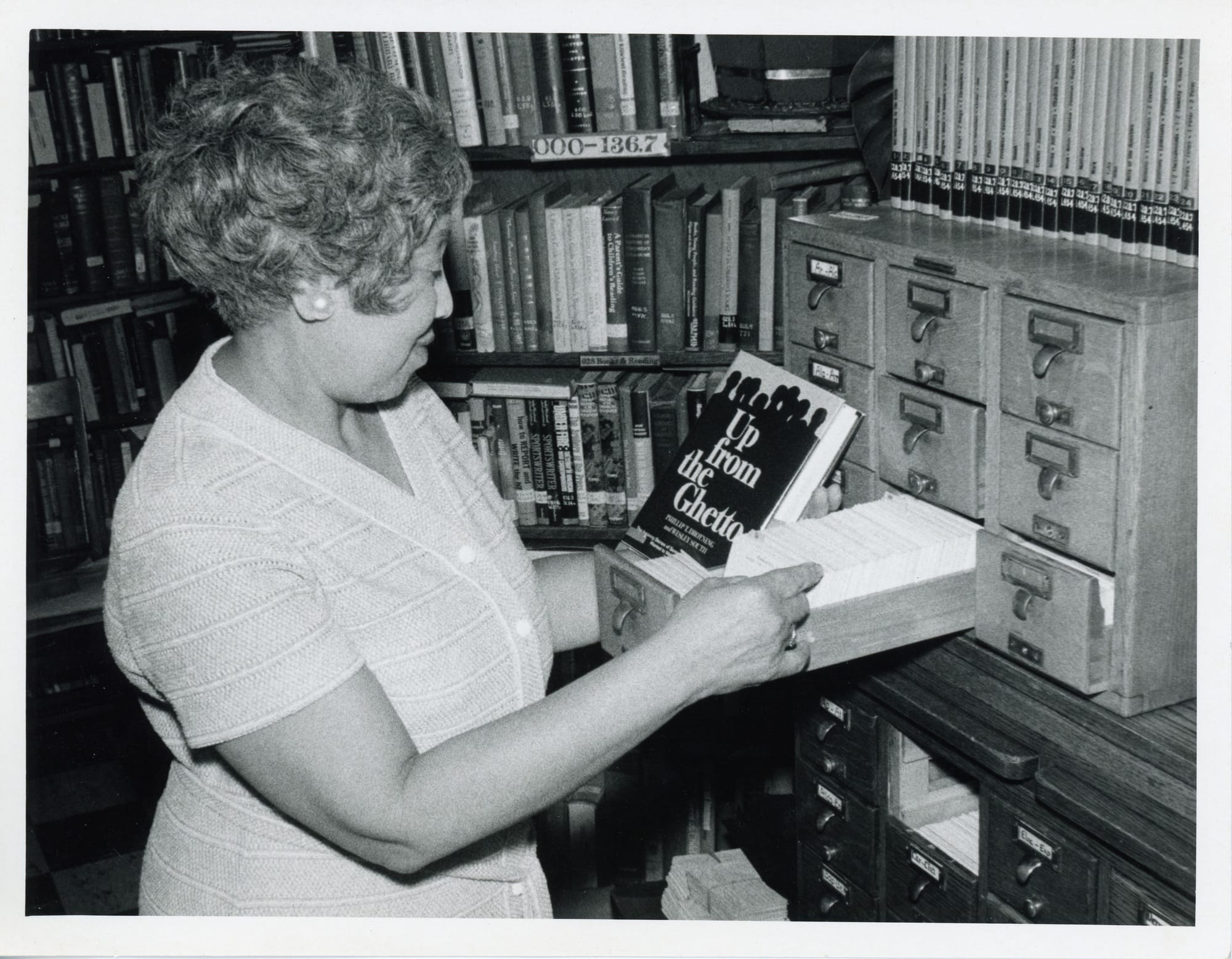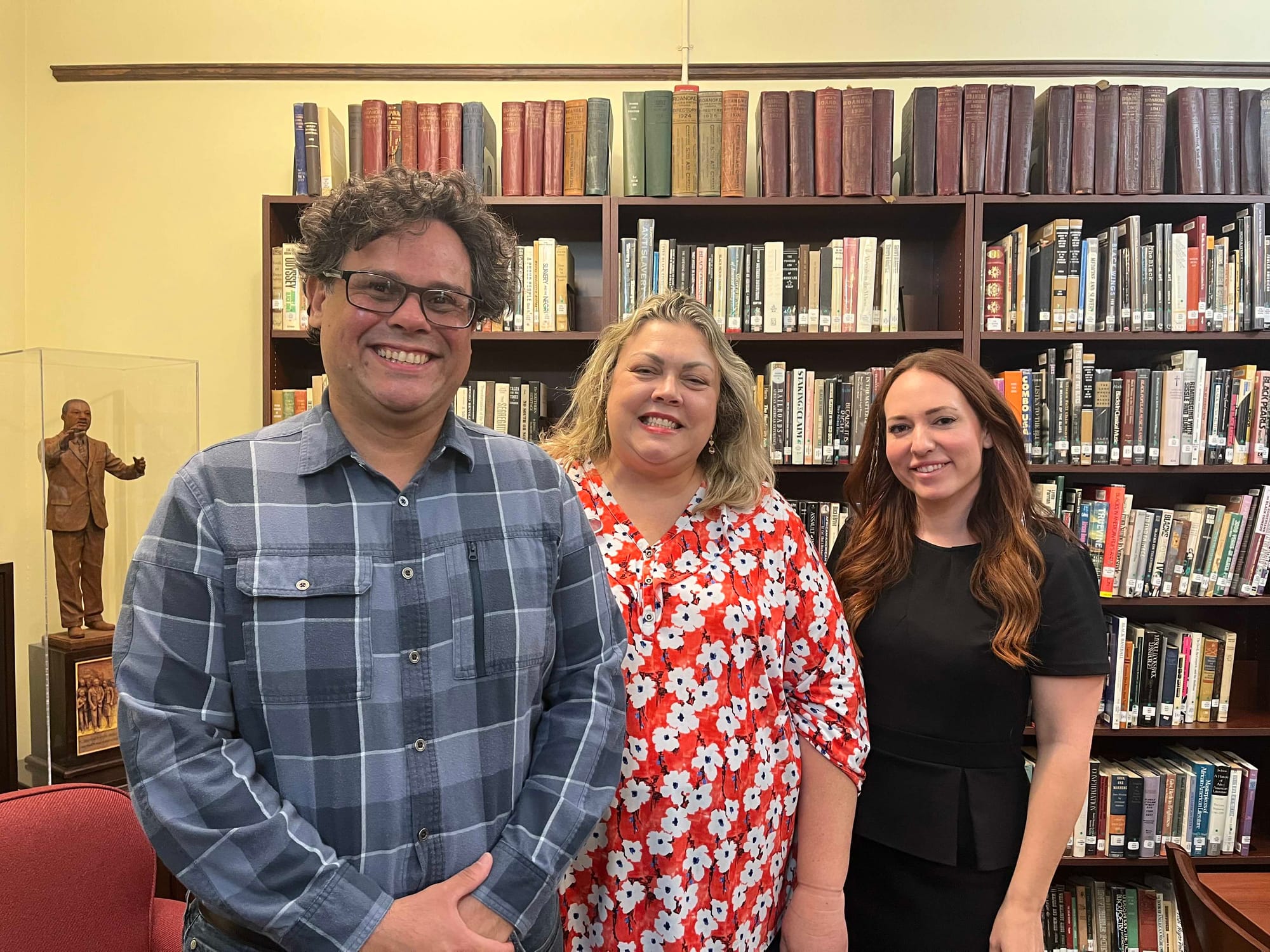Roanoke Equity Board Plans Public Outreach for Urban Renewal Apology
Three new members to the Equity and Empowerment Advisory Board reenergized the conversation after months of limbo.

A portrait of longtime librarian Virginia Y. Lee watched on as members of Roanoke’s equity board gathered this month in the room dedicated to her name.
It was a fitting setting for the board’s meeting.
In the 1940s, Roanoke officials ordered Lee, the Gainsboro librarian, to remove her collection of Black history and literature from the library. Lee refused to comply. Instead, she moved the archive into the basement, where she continued to operate the collection out of public view.
Much like Lee’s once-secret collection, the Equity and Empowerment Advisory Board — formed by City Council in 2020 amid a national reckoning on racism — has recently been operating under the radar. The July 10 meeting marked the board’s second since its webpage was quietly removed from the city’s website earlier this year. In the wake of President Donald Trump’s executive order, “Ending Radical and Wasteful Government DEI Programs and Preferencing,” the city cleared government webpages of language related to diversity, equity and inclusion.
The lack of online presence has not stopped the interest of those willing to serve on the board. The meeting was the second for three new members: Briana Apgar, Sally McQuinn and Juan Carlos Mejia, who each bring unique experiences to the group of volunteers.
They joined the board in revisiting a long-standing draft of a city apology for urban renewal, which now appears on track for public outreach this fall after months of limbo. The proposed apology would acknowledge the lasting harm caused by city policies that razed Black homes and businesses in Gainsboro and Northeast Roanoke to clear the way for redevelopment between the 1950s and 1970s.
The board now hopes to present a draft apology to City Council this December, about two years after embarking on the project. Momentum stalled in March 2024 after controversy over the city’s approach to a development plan for Evans Spring.
Apgar expressed concern that the board had become “stuck” on the phrasing of the apology — especially in the list of 12 points included at the end of the document. The list combines acknowledgements of community harm with proposed action items such as: “City Council commits to the investment of resources to create opportunities for economic equity for Roanoke’s African-American population to thrive.”
“I worry that if you're waiting to present more smart goals, more true metrics, more true action plan — which seems like that's where a lot of our conversation is circulating around — I don’t know that it’s going to get past this step,” Apgar said.
“It's a really turbulent time and everything is changing right now, but if you're waiting for perfect, you'll never have progress,” she continued.

In an interview after the meeting, Apgar shared that the pace of the drafting process sparked her concern as a new member. “I just got there, but it seemed like it had been a year plus and a step hadn't been taken,” she said.
“I've only been to two meetings, but I think there may be a challenge, not with passion, but with actionable steps and momentum,” she added. “If we are looking for these solutions in which everyone will fully 100 percent agree, I don't think that's going to be there.”
Apgar said her interest in the EEAB stems from her public health background, a career that has included managing population health with the Virginia Department of Health and teaching courses at Roanoke College as an adjunct faculty member. Through her work, Apgar has observed stark disparities in healthcare across the state. This includes in Roanoke, she said, where there’s a significant gap in health outcomes that can be tied to historical redlining, a discriminatory process of withholding financial services from racial minority neighborhoods.
“One of the reasons I am interested in the apology is because one thing that I'm really passionate about is addressing redlining, and that often goes hand in hand with urban renewal,” she said. “When you overlay the life expectancy of Roanoke City zip codes with one of the original redlined maps of Roanoke, it's very alarming how they overlay so well with one another.”
Apgar described herself as “incredibly moderate” with a knack for “bringing different-minded people together,” an ability she hopes to bring to her tenure on the board. “That's something that I think is a strength of mine,” she said. “We all believe in the same vision. We all want the same outcome, but we vary in the steps that we see to get there. So how can we do this?’”
McQuinn supported Apgar’s sense of urgency for moving the apology forward.
“It's been going on for a while, as we've all noted,” she said. “And taking the responsibility, expressing the apology is the first step, you know. And I feel like it's time to take that first step.”
McQuinn joins the board with a decades-long career in education. Her work has taken her around the world, ranging from a stint teaching with the Peace Corps in the Marshall Islands, to working in higher education in Dubai, she said. After spending much of her career overseas, McQuinn and her family settled in Roanoke eight years ago. Since returning stateside, McQuinn worked at Virginia Western Community College as a curriculum developer and course coordinator before becoming the assistant director at Virginia Tech Roanoke Center.
McQuinn said she was excited to apply for the board at the beginning of the year. However, when she returned to the EEAB’s webpage to check on her application, she was surprised to find that it had disappeared. “I was a little concerned about the future of the EEAB, and whether my appointment was even going to materialize,” she recalled.
McQuinn understands the site’s erasure as part of a nationwide trend she’s also experienced in higher education. In March, Virginia Tech dissolved several of its diversity, equity and inclusion initiatives to comply with an order from the Trump administration.
“I understand that is part of the game we play,” she said of the city’s decision to take down the site. “Some words are just going to cause more trouble than others.”
Beyond working on the urban renewal apology, McQuinn said she is eager to bring new objectives to the table, including affordable housing and working to support Roanoke’s immigrant community. “I hope that my experience with working with newcomers and refugees in education for most of my career will be an asset and help us,” she said.
Working with immigrants is a priority for Mejia, who teaches Spanish at William Fleming High School. He said he also runs the nonprofit Center for Demography and Human Rights. At the end of July’s meeting, he expressed his concern about immigration enforcement in Roanoke, which has ramped up across the country under the Trump administration.
“I have to bring up the topic of the Latino community being chased and being harassed right now for deportation and ICE,” he said.
The issue hits close to home for Mejia, who immigrated to the United States from Venezuela in 2017, he said. In an interview after the meeting, Mejia shared that language barriers and cultural differences make it difficult for Roanoke’s Latino community to navigate city resources — and more fundamentally, feel like a part of the city. “How can we make them feel like Roanokers or Virginians or Americans as much as anyone else?” he asked.
Mejia laid out his goals for his time on the board: “Help as much as I can, make the Latino community more of a part of this city and inform the Latino community that we're here for them as well.”
Mejia also shared his fellow newcomers’ enthusiasm for advancing the apology draft, volunteering to help develop a community survey.
“I feel like this is amazing,” he said in the meeting. “I haven’t heard any United States government — local, state level, federal — saying, yeah, it's time to make some reparations to our community for what we did."
“When justice happens, regardless of the time, it's always important, it's always good, it's always necessary,” he said later in an interview. “So it could happen now, or it could happen in 100 years — hopefully not. But whenever it actually happens, if it's real, like we feel like we're doing it sincerely, it makes a difference."
Chair Angela Penn walked the board through an updated timeline for finalizing the apology draft by the end of the year: consult subcommittees in August, host a public hearing in September, schedule a survey and more community meetings in October and finally, refine the draft during November’s meeting. Penn suggested presenting the finalized draft to City Council at the board’s scheduled meeting in December.
After a period of time without a full board, new members brought “renewed momentum” to the group, Penn shared in an email. “Thursday’s meeting was especially productive and energized,” she wrote. “I was deeply encouraged by the thoughtful contributions from our new members.”
The board’s next meeting is scheduled for Sept. 4.

